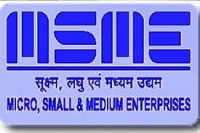
To promote these micro enterprises in the country, KVIC implements one of the major programme namely Prime Minister’s Employment Generation Programme (PMEGP). PMEGP is a credit linked subsidy scheme, for setting up of new micro-enterprises and to generate employment opportunities in rural as well as urban areas of the country. General category beneficiaries can avail of margin money subsidy of 25% of the project cost to set up projects in rural areas and 15% in urban areas where as for beneficiaries belonging to SC/ST/Women/PH/Minorities/Ex-Servicemen/NER, the margin money subsidy is 35% for rural areas and 25% for urban areas. The maximum cost of projects eligible for margin money subsidy is Rs.25 lakh in the manufacturing sector and Rs.10 lakh in the service sector.
Shri Nitin Gadkari, Union Minister for Micro, Small and Medium Enterprises has informed that There is vast scope for Agro based and Food Processing industries in the country. It is seen that 17.44 % of units of ABFPI were assisted out of total units assisted under PMEGP during last three years.
The status of the units under ABFPI assisted during last three years is given as below:-
| Year | Total No. of project assisted under PMEGP | Project assisted under ABFPI in PMEGP | Percentage of ABFPI units out of total units set up under PMEGP |
| 2016-17 | 52912 | 8944 | 16.90% |
| 2017-18 | 48398 | 8386 | 17.33% |
| 2018-19 (Provisional) | 73427 | 11901 | 16.21% |
Khadi and Village Industries Commission, a statutory body under Ministry of Micro, Small & Medium Enterprises promotes non-agricultural and post harvesting activities under following village industries groups:
- Agro Based & Food Processing Industry (ABFPI) includes industries viz. Pulses & Cereals Processing Industry, Gur & Khandsari Industry, Palmgur Industry, Fruit & Vegetable Processing Industry, Village Oil Industry, Pickle, Jam & Papad making industries etc.
- Forest Based Industry (FBI) includes industries viz. Medicinal Plants Industry, Beekeeping Industry, Minor Forest Based Industries, etc.
- Handmade Paper and Fibre Industry (HMPFI) includes industries viz. Handmade Paper Industry, Fibre Industry, etc.
- Mineral Based Industry (MBI) includes industries viz. Pottery, Lime, Plaster of Paris products, Stone Crushing & Carving etc.
- Polymer and Chemical Based Industry (PCBI) includes industries viz. Leather Industry, Non-edible Oil & Soap Industry, Detergent Powder, Candle making, Cottage Match Industry, Plastic Industry, etc.
- Rural Engineering and Bio-Technology Industry (REBTI) includes industries viz. Non-Conventional Energy, Bio-gas plants, Carpentry & Black smithy, Electronics, etc.
- Service & Textile Industry (STI) includes industries viz. Electronic and Electrical devise repairing, Machine repairing, Plumbing and other servicing works, Sweater Hosiery, Band aid cloth and other textile products etc.
KVIC has taken following steps to propagate the KVI programme:
- Awareness camps, workshops, buyer seller meets organize at different levels including international trade fair and exhibitions;
- Publicity is made through print and electronic media at different occasions;
- Assist entrepreneurs in marketing exhibitions which are organized at national, state and district level;
- Skill development training in various disciplines is imparted. The person trained can availbenefits of KVI schemes and set their own enterprise; and
- As per gazette Notification of Govt. of India “The Central Government Ministries, Departments and Public Sector Undertakings shall procure minimum 25% of their annual value of goods or services from Micro and Small Enterprises.”
The small and micro industries usually face difficulties in mobilizing the capital to set up their industries and also market their products in competitive environment. In order to address these difficulties and support, not only setting up of micro industries but to make them sustainable, KVIC provides margin money subsidy under PMEGP scheme so that more and more micro industries can be promoted and employment opportunities could be generated.







Leave a Reply
You must be logged in to post a comment.